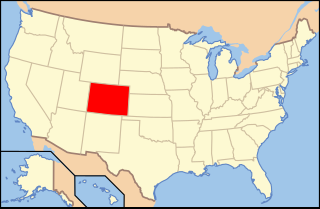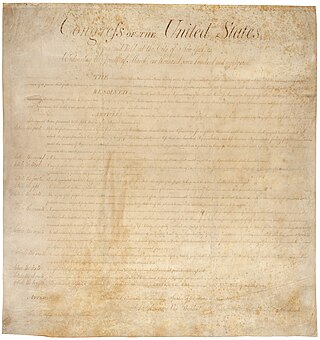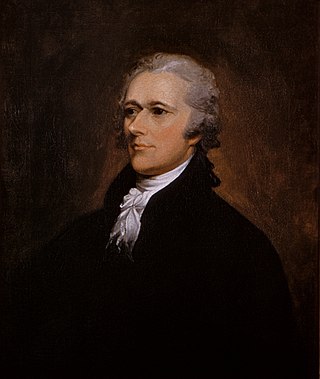Miranda v. Arizona, 384 U.S. 436 (1966), was a landmark decision of the U.S. Supreme Court in which the Court ruled that the Fifth Amendment to the U.S. Constitution restricts prosecutors from using a person's statements made in response to interrogation in police custody as evidence at their trial unless they can show that the person was informed of the right to consult with an attorney before and during questioning, and of the right against self-incrimination before police questioning, and that the defendant not only understood these rights but also voluntarily waived them.
Wolf v. Colorado, 338 U.S. 25 (1949), was a United States Supreme Court case in which the Court held 6—3 that, while the Fourth Amendment was applicable to the states, the exclusionary rule was not a necessary ingredient of the Fourth Amendment's right against warrantless and unreasonable searches and seizures. In Weeks v. United States, 232 U.S. 383 (1914), the Court held that as a matter of judicial implication the exclusionary rule was enforceable in federal courts but not derived from the explicit requirements of the Fourth Amendment. The Wolf Court decided not to incorporate the exclusionary rule as part of the Fourteenth Amendment in large part because the states which had rejected the Weeks Doctrine had not left the right to privacy without other means of protection. However, because most of the states' rules proved to be ineffective in deterrence, the Court overruled Wolf in Mapp v. Ohio, 367 U.S. 643 (1961). That landmark case made history as the exclusionary rule enforceable against the states through the Due Process clause of the Fourteenth Amendment to the same extent that it applied against the federal government.

The Colorado Supreme Court is the highest court in the U.S. state of Colorado. Located in Denver, the Court consists of a Chief Justice and six Associate Justices.

Timothy Michael Tymkovich is a United States circuit judge of the United States Court of Appeals for the Tenth Circuit.

Amendment 41 is a citizen initiative adopted by Colorado voters in the 2006 general election. Amendment 41 has three main sections.

The Stolen Valor Act of 2005, signed into law by President George W. Bush on December 20, 2006, was a U.S. law that broadened the provisions of previous U.S. law addressing the unauthorized wear, manufacture, or sale of any military decorations and medals. The law made it a federal misdemeanor to falsely represent oneself as having received any U.S. military decoration or medal. If convicted, defendants might have been imprisoned for up to six months, unless the decoration lied about is the Medal of Honor, in which case imprisonment could have been up to one year. In United States v. Alvarez (2012), the Supreme Court of the United States ruled that the Stolen Valor Act of 2005 was an unconstitutional abridgment of the freedom of speech under the First Amendment–striking down the law in a 6 to 3 decision.

Troy Anthony Davis was a man convicted of and executed for the August 19, 1989 murder of police officer Mark MacPhail in Savannah, Georgia. MacPhail was working as a security guard at a Burger King restaurant and was intervening to defend a man being assaulted in a nearby parking lot when he was murdered. During Davis's 1991 trial, seven witnesses testified they had seen Davis shoot MacPhail, and two others testified Davis had confessed the murder to them. There were 34 witnesses who testified for the prosecution, and six others for the defense, including Davis. Although the murder weapon was not recovered, ballistic evidence presented at trial linked bullets recovered at or near the scene to those at another shooting in which Davis was also charged. He was convicted of murder and various lesser charges, including the earlier shooting, and was sentenced to death in August 1991.
Same-sex marriage has been legally recognized in Colorado since October 7, 2014. Colorado's state constitutional ban on same-sex marriage was struck down in state district court on July 9, 2014, and by the U.S. District Court for the District of Colorado on July 23, 2014. The Tenth Circuit Court of Appeals had already made similar rulings with respect to such bans in Utah on June 25 and Oklahoma on July 18, which are binding precedents on courts in Colorado. On October 6, 2014, the U.S. Supreme Court declined to hear the Tenth Circuit cases, and the Tenth Circuit lifted its stay. On October 7, 2014, the Colorado Supreme Court and the Tenth Circuit cleared the way for same-sex marriages to begin in Colorado.
The issue of school speech or curricular speech as it relates to the First Amendment to the United States Constitution has been the center of controversy and litigation since the mid-20th century. The First Amendment's guarantee of freedom of speech applies to students in the public schools. In the landmark decision Tinker v. Des Moines Independent Community School District, the U.S. Supreme Court formally recognized that students do not "shed their constitutional rights to freedom of speech or expression at the schoolhouse gate".
Threatening the president of the United States is a federal felony under United States Code Title 18, Section 871. It consists of knowingly and willfully mailing or otherwise making "any threat to take the life of, to kidnap, or to inflict great bodily harm upon the president of the United States". The law also includes presidential candidates, vice presidents, and former presidents. The Secret Service investigates suspected violations of this law and monitors those who have a history of threatening the president. Threatening the president is considered a political offense. Immigrants who commit this crime can be deported.
A true threat is a threatening communication that can be prosecuted under the law. It is distinct from a threat that is made in jest. The U.S. Supreme Court has held that true threats are not protected under the U.S. Constitution based on three justifications: preventing fear, preventing the disruption that follows from that fear, and diminishing the likelihood that the threatened violence will occur. There is some concern that even satirical speech could be regarded as a "true threat" due to concern over terrorism.

Lesbian, gay, bisexual, and transgender (LGBT) persons in the U.S. state of Colorado enjoy the same rights as non-LGBT people. Same-sex sexual activity has been legal in Colorado since 1972. Same-sex marriage has been recognized since October 2014, and the state enacted civil unions in 2013, which provide some of the rights and benefits of marriage. State law also prohibits discrimination on account of sexual orientation and gender identity in employment, housing and public accommodations and the use of conversion therapy on minors. In July 2020, Colorado became the 11th US state to abolish the gay panic defense.

In the United States, some categories of speech are not protected by the First Amendment. According to the Supreme Court of the United States, the U.S. Constitution protects free speech while allowing limitations on certain categories of speech.
Elonis v. United States, 575 U.S. 723 (2015), was a United States Supreme Court case concerning whether conviction of threatening another person over interstate lines requires proof of subjective intent to threaten or whether it is enough to show that a "reasonable person" would regard the statement as threatening. In controversy were the purported threats of violent rap lyrics written by Anthony Douglas Elonis and posted to Facebook under a pseudonym. The ACLU filed an amicus brief in support of the petitioner. It was the first time the Court has heard a case considering true threats and the limits of speech on social media.
Masterpiece Cakeshop v. Colorado Civil Rights Commission, 584 U.S. ___ (2018), was a case in the Supreme Court of the United States that dealt with whether owners of public accommodations can refuse certain services based on the First Amendment claims of free speech and free exercise of religion, and therefore be granted an exemption from laws ensuring non-discrimination in public accommodations—in particular, by refusing to provide creative services, such as making a custom wedding cake for the marriage of a gay couple, on the basis of the owner's religious beliefs.

In the 2016 United States presidential election, ten members of the Electoral College voted or attempted to vote for a candidate different from the ones to whom they were pledged. Three of these votes were invalidated under the faithless elector laws of their respective states, and the elector either subsequently voted for the pledged candidate or was replaced by someone who did. Although there had been a combined total of 155 instances of individual electors voting faithlessly prior to 2016 in over two centuries of previous US presidential elections, 2016 was the first election in over a hundred years in which multiple electors worked to alter the result of the election.
303 Creative LLC v. Elenis, 600 U.S. 570 (2023), is a United States Supreme Court decision that dealt with the intersection of anti-discrimination law in public accommodations with the Free Speech Clause of the First Amendment to the United States Constitution. In a 6–3 decision, the Court found for a website designer, ruling that the state of Colorado cannot compel the designer to create work that violates her values. The case follows from Masterpiece Cakeshop v. Colorado Civil Rights Commission, 584 U.S. ___ (2018), which had dealt with similar conflict between free speech rights and Colorado's anti-discrimination laws, but was decided on narrower grounds.
Counterman v. Colorado, 600 U.S. 66 (2023), is a case of the Supreme Court of the United States concerning the line between true threats of violence punishable as crimes and free speech protected by the First Amendment. The states and lower courts were divided over how to define the line. By a 7-2 majority, the court decided that statements are not free speech if the defendant recklessly disregarded a substantial risk that their statements would be viewed as threatening violence.








